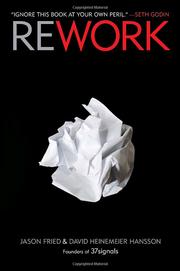Rework by Jason Fried and David Heinemeier Hansson - ISBN 0307463745 - Crown Business 2010
Motivation
Required for MBE and recommended by Thomas.
Pre-reading model
Draw a schema (using PmGraphViz or another solution) of the situation of the area in the studied domain before having read the book.
Reading
Opening by rebutting critics by saying that 37signals, founded by the author, followed and is still following this principle thus that they are correct.
- First
- everybody is not looking for the same result (A-type vs others) so the means will logically differ (p7)
- Takedowns
- casting doubts on the learning from mistakes heuristics, mention of a study on chances of failed entrepreneurs equaled to new entrants (p11)
- promoting efficiency rather than amount of worked done
- Go
- on motivation and impact (p29)
- solve your own problem first
- applies particularly well to a software company working on managing tasks
- starts with whatever you have
- reminder of the prototype eureka scene in The Social Network
- all feedback is meaningful yet focus matters more than covering all possible existing (or not) problems
- strategical choices have to be made on what features to develop and which ones to reject
- critics of the startup model (financing and partial loss of control but also no immediate focus on ROI) and also of the consequences for the founder (shift in motivation, possible loss of what made him happy)
- cost of commitments for means of production
- Progress
- constraints are powerful and should be leverage, especially when you have very little resources to waste (p65)
- since you will inevitably drift, do not delay the core, start with it then eventually shift
- details are important, but not without having a solid structure first
- effort invested will pay off especially since this should not change a lot
- manage tasks by making progresses explicit, assessable
- have a recycling mindset, if you can sell the peels of the potatoes, do so
- when you are ready to launch, it usually means you could have launched some time ago, it's about delivered value, not polish
- Productivity
- focus on the right problem first (p95)
- critics of administrative overhead, including meetings, and lack of focus
- on the importance of sleep
- a long list of tasks is a depressing, split to edible chunks
- Competitors
- on copy and the inability to lead (p133)
- have a USP even if you are selling air
- (again) less is more
- Evolution
- (again yet againg!) yet another feature is not the solution (p151)
- good advertisement does not make a good product
- Promotion
- being unknown is ok, at first (p165)
- becoming popular by giving value (e.g. through education) builds a stronger base fan or audience
- this should be continuous, not sporadically through campaigns
- Hiring
- hire yourself first, once you can do the job you can understand who will do it well for you if you really have to (p199)
- hire to get a job done, not just for the intrinsic qualities of the person
- it is possible to work internationally even at small scale through modern means of communication (if done properly, e.g. managing time overlap)
- Damage Control
- control the flow of information (p229)
- be real rather than hiding behind "corporate talk"
- Culture
- culture is a repetitive set of actions, not a fantasized description (p247)
- on the risk of over-administrating every single moves
- Conclusion
- leverage inspiration and cherish it as a rare and powerful asset (p269)
See also
Overall remarks and questions
Synthesis
Advising minimalism, focus and straight talk to make small businesses thrive.
Critics
- Even if the book does open by saying that this did work and apply to their own situation, the tone of the book makes it sound generalist.
- It is important to keep in mind that those lessons learn might not be generalizable
Vocabulary
(:new_vocabulary_start:)
new_word
(:new_vocabulary_end:)
Post-reading model
Draw a schema (using PmGraphViz or another solution) of the situation of the area in the studied domain after having read the book. Link it to the pre-reading model and align the two to help easy comparison.
Categories
Back to the Menu
 Fabien Benetou's PIM
Fabien Benetou's PIM






